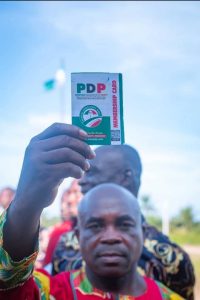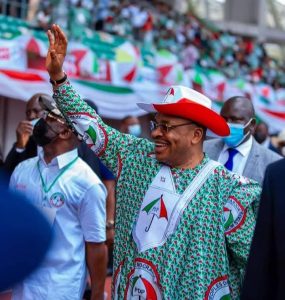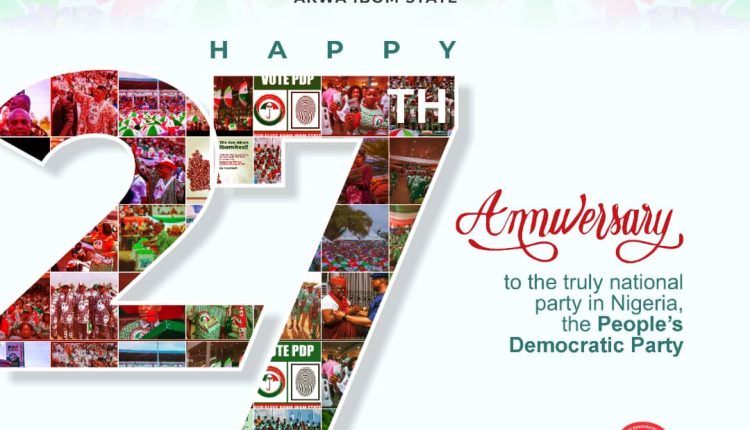Twenty-Seven and Rising: Why the PDP’s Best Days Lie Ahead

By Borono Bassey
Today, if you mention the name Peoples Democratic Party in a gathering of Nigerians who are old enough to make sense of politics, governance and civics, there is a greater possibility that the crowd in that gathering will break into three camps – those whose memories of the party provoke anger-laden pessimism, those whose hopes for Nigeria still stir a patriotic optimism, and those who would rather perch on the fence with a wary indifference.
Few political organizations anywhere in Africa evoke such a wide spectrum of emotions.
Yet, it is this very polarity that speaks to the PDP’s peculiar place in Nigeria’s national life: it is not a party you can easily ignore, because its story is in many ways the story of our democracy itself.
That story began in defiance. In January 1998, a small group of politicians—first the G7, then the G18, and finally the G34 under Dr. Alex Ekwueme – risked detention and persecution to resist General Abacha’s bid to transmute into a civilian ruler.
Their courage reawakened national consciousness, rallied Nigerians across regions, and eventually birthed a broad-based movement. By August 31st, that same year, the coalition crystallized into the Peoples Democratic Party, with a colourful event at the International Conference Centre, Abuja, a political force literally born from resistance and sacrifice, and destined to become the vessel of Nigeria’s return to democracy.
Now, twenty-seven, the PDP has lived through triumph and turbulence, glory and gaffes, victories and defeats. But what is remarkable is not merely that it has survived; rather, our Party, like the proverbial phoenix, continues to emerge from its own ashes time and again, recalibrating, reforming, and refusing to fade into irrelevance.
Those who know its origin will remember that the PDP was born not in comfort, but rather it was forged in the uncomfortable raging fire of courage. In the tense nights of 1998, as dictatorship darkened the land, men gathered in secret to say no to tyranny.
They were hunted, some jailed, yet their defiance lit the torch that became the umbrella under which millions of Nigerians would eventually stand. That spirit of audacity remains the PDP’s most enduring inheritance.

From the euphoria of 1999 when it steered Nigeria back into democracy, to the sixteen years in which it held the reins of government, shaping policy and direction, the PDP imprinted itself on the nation’s institutions. It was under the party’s watch that Nigeria secured the historic debt relief deal, which freed the economy from crippling obligations.
It was during the Peoples Democratic Party’s era that telecommunications were liberalized, birthing the GSM revolution that today connects millions of Nigerians. The party expanded access to education through new universities and polytechnics, revitalized agriculture through initiatives that boosted local food production, and began the ambitious reform of the health sector. Major infrastructure projects, from highways to power sector investments, bore the imprint of PDP stewardship. It also laid down anti-corruption frameworks that successive governments still lean on.
No serious student of Nigeria’s political history can deny that the PDP gave the country its longest stretch of democratic stability.And perhaps it is for this very reason that Nigerians, having once tasted and enjoyed the benefits of those solid pillars the party erected across all sectors of the economy, now find themselves restless – even angry – that the PDP has not yet mustered enough strength to reclaim power at the center and reposition the nation on the path of accelerated growth and progress.
Their anger is not misplaced. For ten years, the other party has held the reins, and every signpost – from a faltering economy to deepening insecurity – suggests that things will only get worse. In the quiet of homes and in the noise of markets, the refrain grows louder: the party that once set Nigeria on a course of renewal must rise again to rescue it from decline.
Now, at twenty-seven, the party stands not as a tired giant but as a tested one. Opposition has stripped it of arrogance and forced it back to humility, reflection, and rebuilding. The anger of its critics, the optimism of its faithful, and the indifference of the undecided are all proof of its continued relevance. And relevance, in politics, is oxygen.

For if Nigeria’s democracy has sometimes stumbled, the PDP has, in a way, also stumbled with it. But what makes its story different is its resilience. Time after time, defections and defeats have been predicted to spell its demise. Yet each time, the PDP has reminded Nigerians that a party born in the crucible of resistance is not so easily erased. Like a phoenix, it has refused to stay buried in ashes; it has chosen instead to stretch its wings toward the skies of tomorrow.
And the skies of tomorrow hold a brighter promise for our Party and the millions of Nigerians who continue to wish for our Party to return as the Party at the center.

The Nigerian population is one that is made up of predominantly young people – its median age is just under 19. This new generation does not carry the same political baggage as their parents. They want jobs, schools, security, and dignity. A PDP that listens, that places youth at the center of policy, that wields digital tools not only for campaigns but for governance, has the chance to connect the courage of 1998 to the aspirations of 2025 and beyond. If the party once dared to defy a dictator, can it not now dare to defy mediocrity?
The PDP’s strength has always been its breadth – its umbrella stretched across every region, faith, and ethnicity. In a nation too often threatened by divisions, that breadth is not just an asset but a lifeline. At the significant age of 27, if our Party- the PDP takes the patriotic step of recommitting itself to inclusivity, if it resists the lure of narrow interests and embraces once more the spirit of its founders, then our Party can return to hold the reins of Power at the center in the next election cycle. Many things point to that possibility.

Twenty-seven years after its birth, the PDP’s story is still unfinished. Its critics may sneer, its rivals may boast, but the truth remains: the party that began as a whisper in Kaduna still echoes across the land. And as long as it remembers that it was born not just to win elections but to defend democracy, it will continue to rise from every fall.
In the end, the PDP at 27 is more than a political party’s anniversary. It is a reminder that from ashes can come a flame of respite, from setbacks can come strength, and from history can come hope. The PDP, as things currently show,is again on a courageous journey of reinventing itself and becoming the Party to reposition Nigeria on the path of accelerated growth and progress. Its past is indelible, its present undeniable, and its future, which is within grasp, is immeasurably bright!

Happy 27th Anniversary to the Peoples Democratic Party!
*Borono Bassey, a former Spokesman for the PDP in Akwa Ibom State, wrote in from Uyo.
